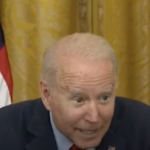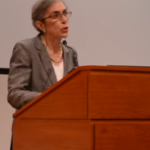The Wilson You Never Knew
Editor’s Note: A version of this article first appeared in USA Today.
On the heels of a recent Sunday magazine profile of Glenn Beck, The New York Times published a roundtable discussion among six scholars on the issue of President Woodrow Wilson. Wilson has become a popular Beck target, and has suddenly emerged as a hot topic in our current politics.
“I hate Woodrow Wilson!” shouted Beck at February’s Conservative Political Action Conference in Washington.
For the record, I was at that gathering, and I’m a conservative, I like Beck, and I don’t hate Wilson. My take on Wilson, however, is very different from what I’m hearing from Beck or from scholars on the left or right, whether pro-Wilson or anti-Wilson. It relates to a crucial aspect of Wilson that needs to be better known and which, dare I say, might even prompt Beck to amend his view—slightly perhaps.
First, let me say that I agree with several important criticisms of Wilson. His views on race and segregation were deeply offensive. His wielding of state power was often repressive, even abusive, particularly during wartime. And the long progression of a seemingly non-stop, ever-increasing centralization of policy and programs in Washington arguably began under Wilson.
Yet, one critical component of Wilson is missed by both sides, which conservatives should like and liberals might not: Wilson was stridently, vocally anti-communist. He staunchly opposed Bolshevism in particular.
My personal experience with this is instructive. I develop this point on Wilson in my latest book, where I throw conservatives a curveball with a kickoff chapter titled, “Woodrow Wilson: ‘Utter Simpleton.'” Given that my book is about how communists deliberately and cynically duped liberals/progressives, conservatives initially expect Wilson will be my first dupe.
To the contrary, Wilson was called an “utter simpleton” by Vladimir Lenin, who, along with communists from Moscow to New York, demonized Wilson. They ridiculed his League of Nations, his ideas and his administration, openly calling for the “overthrow” of the U.S. government. It was for such reasons, not to mention an intense faith that saw communism as militantly atheistic, that Wilson vehemently opposed communism.
Wilson dubbed the Bolsheviks “barbarians,” “terrorists,” and “tyrants.” He said they were engaged in a “brutal” campaign of “mass terrorism,” of “blood and terror,” of “indiscriminate slaughter” through “cunning” and “savage oppression.” The “violent and tyrannical” Bolsheviks were “the most consummate sneaks in the world,” and Bolshevism was an “ugly, poisonous thing.” Wilson warned that the Bolsheviks were pushing an “expansionist” ideology that they wanted to export “throughout the world,” including into the United States.
Most significant, Wilson and his State Department insisted that America should not have diplomatic relations or try to find common ground with the Bolsheviks. “In the view of this government,” said Wilson’s State Department in August 1920, “there cannot be any common ground upon which it can stand with a power whose conceptions of international relations are so entirely alien to its own, so utterly repugnant to its moral sense. … We cannot recognize, hold official relations with, or give friendly reception to the agents of a government which is determined and bound to conspire against our institutions; whose diplomats will be the agitators of dangerous revolt; whose spokesmen say that they sign agreements with no intention of keeping them.”
One of Wilson’s more striking displays was a Sept. 6, 1919, speech in Kansas City, where the great liberal seemed to engage in what his liberal forebears would certainly consider Red-baiting.
Reiterating his “abhorrence” of Bolshevism, Wilson was stumping for the Versailles Treaty ending World War I, which was being opposed by isolationist Republicans. Here, Wilson compared that Republican opposition to the Bolshevik “spirit.” He told his critics to “put up or shut up,” and then asserted: “Opposition constructs nothing. Opposition is the specialty of those who are Bolshevistically inclined.”
President Wilson was so concerned about international communism that he actually aided the forces fighting the Bolsheviks in the Russian Civil War. He supported a naval blockade of a Red-controlled area inside the USSR, and even joined a multinational Western coalition in sending troops—a huge contingent of over 10,000 American boys—to battle the Bolsheviks.
Wilson’s characterization of Bolshevism and the communist threat was hardly ill-informed. Highly educated, Wilson suffered no delusions about Marxism-Leninism, and knew that the American Communist Party was not simply another political party. He was a man of the progressive left who understood the destructiveness of the communist left. He observed how communists lied to and sought to manipulate his fellow progressives.
That is why communists, from Moscow to New York to Chicago, despised Wilson. It’s a side of the renowned progressive that few, on the left or right, seem to remember or acknowledge. It’s also a key reason why conservatives—Beck included—who, if nothing else, are vociferously anti-communist, might reconsider Wilson, at least somewhat.
V&V
Dr. Paul Kengor is professor of political science at Grove City College and executive director of The Center for Vision & Values at Grove City College, which distributed this column. His books include “The Crusader: Ronald Reagan and the Fall of Communism” and the newly released “Dupes: How America’s Adversaries Have Manipulated Progressives for a Century.”




